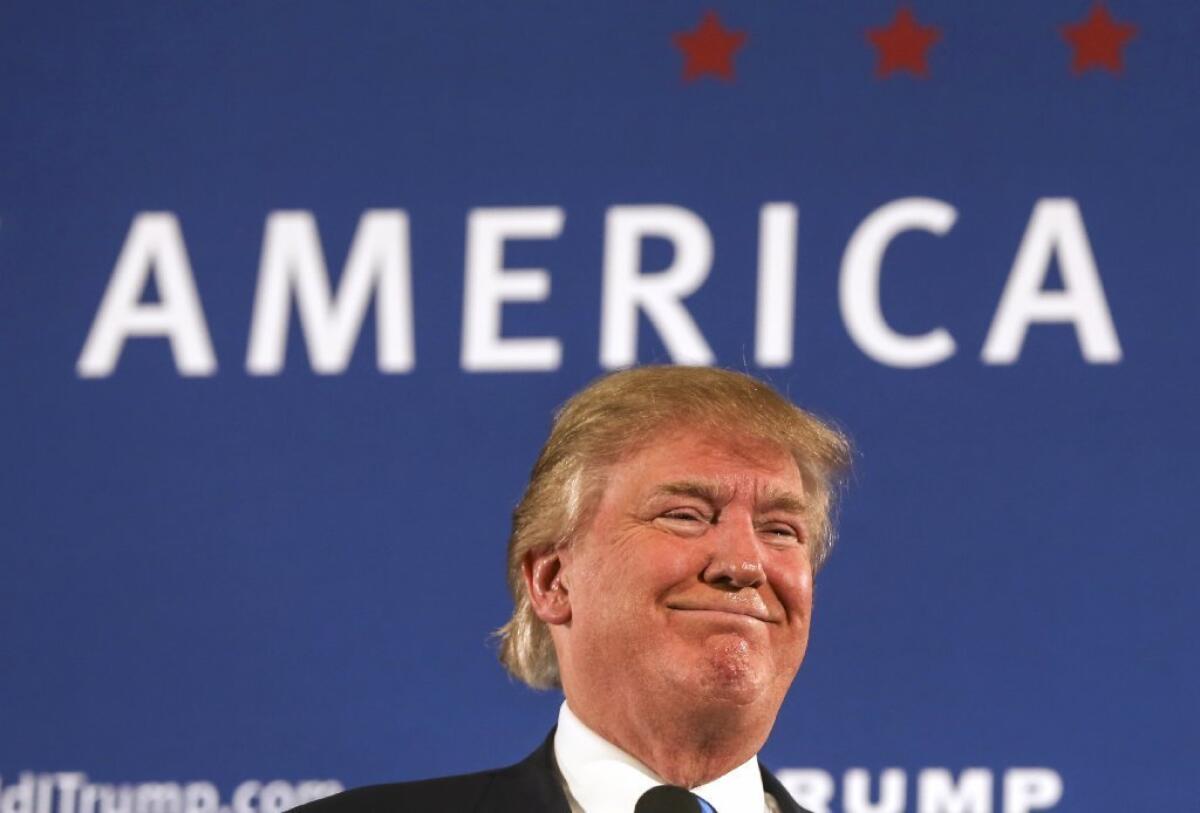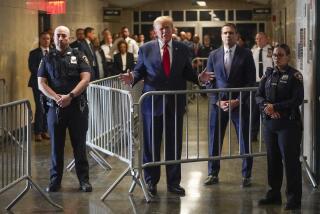Opinion: Trump donors prove that, yes, money is speech

Donald Trump smiles after speaking at Atkinson Country Club in Atkinson, N.H., on Monday.
Critics of Citizens United like to mock that 2010 Supreme Court decision for its supposed conclusion that “money is speech.”
Actually, what Justice Anthony M. Kennedy said in his majority opinion was this: “All speakers, including individuals and the media, use money amassed from the economic marketplace to fund their speech. The 1st Amendment protects the resulting speech . . .”
Supporters of Donald Trump’s presidential candidacy seem to agree.
My Los Angeles Times colleagues Mark Z. Barabak and Michael Finnegan recently interviewed people who had contributed to The Donald’s campaign, despite the fact that he’s wealthy and doesn’t need their donations and despite the fact that their money wouldn’t buy them any influence. (In fact, they liked the idea that Trump “can’t be bought.”)
James Radcliffe, a dentist from New Jersey, said his $500 contribution was a way of telling Trump to stay strong and hang tough.
“I think if you’re getting $10, $15, $100 from people, it sends a nice message,” said Radcliffe, who likes Trump’s stand on immigration.
Radcliffe is one of 74,000 Trump donors who are engaging in what some would consider the political equivalent of sending coals to Newcastle.
To quote Barabak and Finnegan: “Although some might question the point of sending money to a person of such extraordinary means, especially one with such conspicuously lavish tastes, more than a dozen interviews with Trump donors around the country found no such hesitation.
“People gave because Trump says things no conventional politician dares to say. They gave because it makes them feel like a part of his campaign and, they said, like they were investing in a better future for America.”
In a 1976 decision, Buckley vs. Valeo, the Supreme Court recognized that contributions to candidates “implicate fundamental 1st Amendment interests.” But the court upheld limits on direct political contributions anyway because of a competing interest in limiting the “actuality and appearance of corruption.”
Contrary to what you may have heard, Citizens United didn’t disturb such limits, which currently impose a ceiling of $2,700 on individual contributions to federal candidates.
The court in Citizens United did strike down limits on how much corporations (and by extension unions) could spend on independent political expenditures, including television advertising. But that reflected a longstanding (and admittedly controversial) assumption that independent spending poses less of a danger of corruption than direct donations to a campaign that the candidate can use to frame his message.
Still, the Trump supporters who are sending money to a candidate who doesn’t need it are a reminder that lots of Americans – Republicans, Democrats, rich and poor – do see campaign contributions as a way to invest in what they see as a better future for America. They’re putting their money where their mouths are. And both the money and the mouths are protected by the 1st Amendment.
Follow Michael McGough on Twitter @MichaelMcGough3.
MORE FROM OPINION
States resort to illegal imports for execution drugs
Opinion: What kind of ‘socialist’ is Bernie Sanders?
Did the Benghazi committee avenge Mitt Romney? Not quite
More to Read
A cure for the common opinion
Get thought-provoking perspectives with our weekly newsletter.
You may occasionally receive promotional content from the Los Angeles Times.







